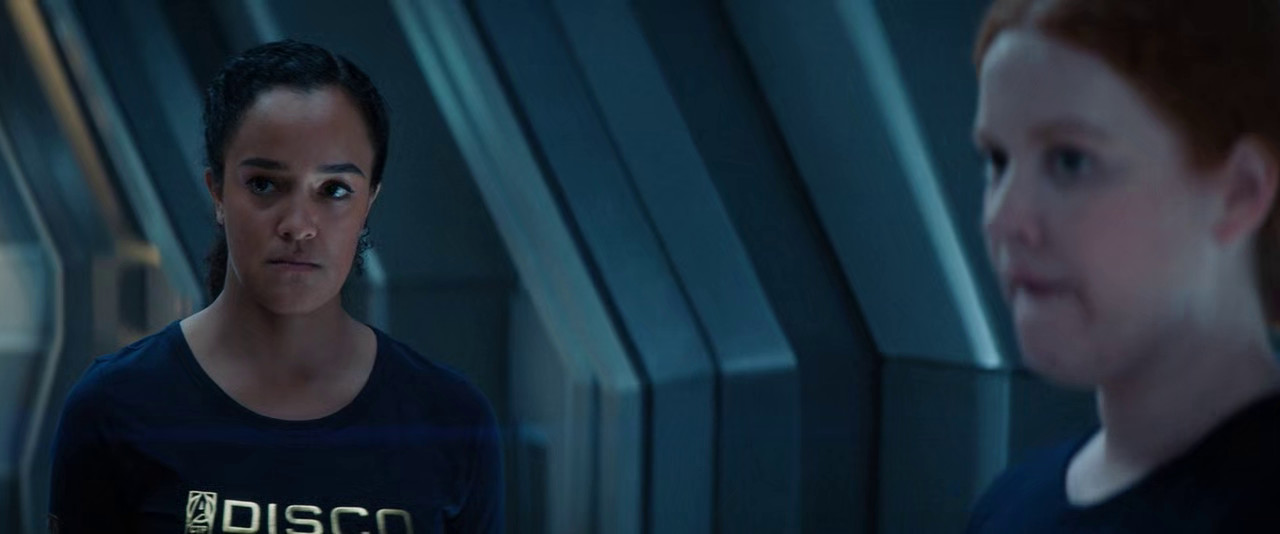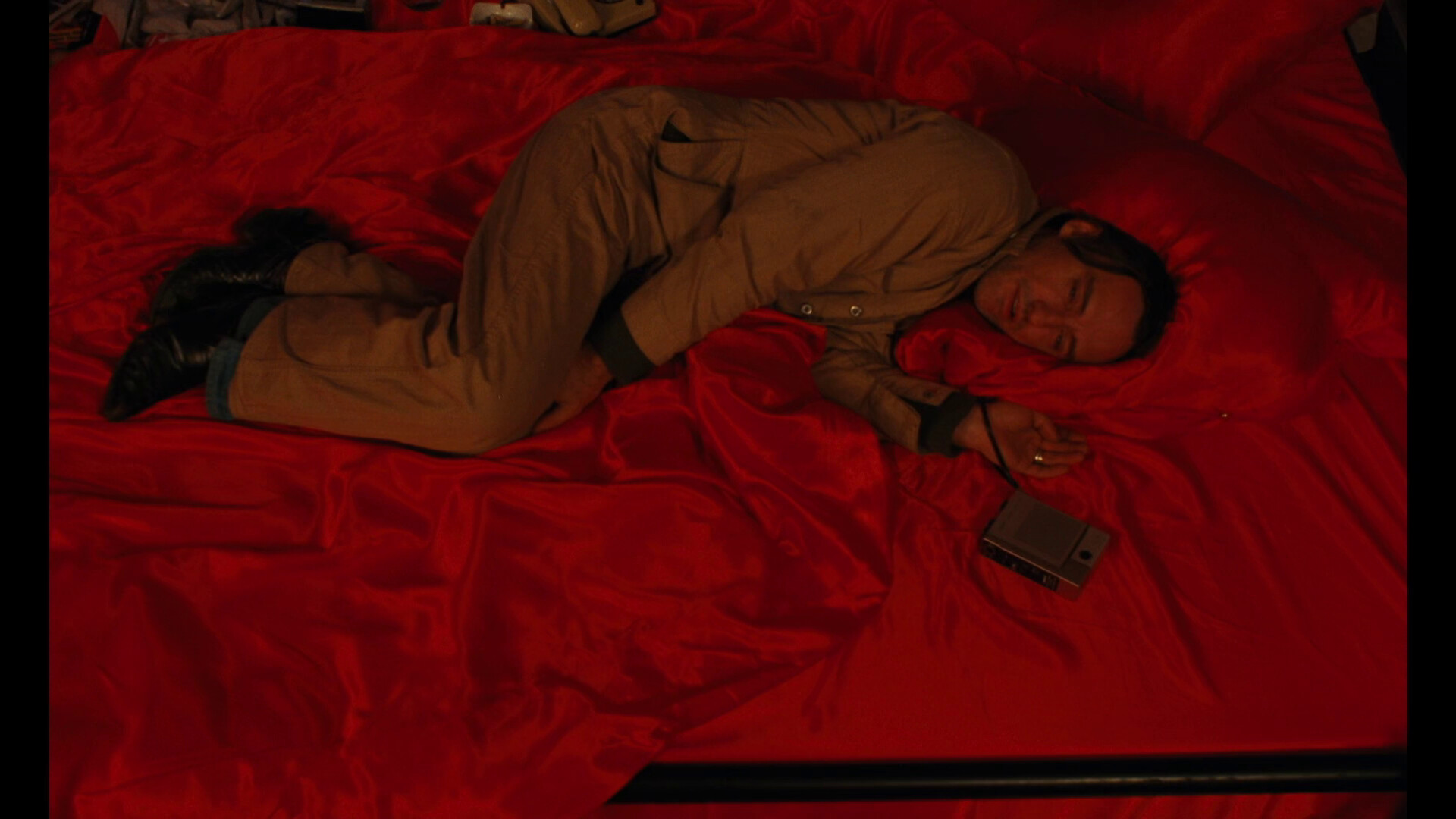In this unseasonably warm weather, some of the clouds look yellow. There’s a moment of disorientation, when I feel it’s the summer again, until I realize the jaundiced cloud is the smoke from a burn pile. Underbrush, trees too close to one another, and debris are collected and burned in order to prevent a larger fire, and to produce The Forest as seen from trails. Overhead, sky cranes, not sounding or looking at all like birds, are busy literally recuperating the summer’s forest fires. I can’t tell which direction they’re going, but I’ve never seen them carrying any of the logs they were built to carry. They must do this largely unobserved, ferrying between steep forested slope and log landing. I’ve been listening to “Holographic Lover” on repeat, and on Star Trek: Discovery, an admiral lightly ribs Captain Pike: “you’re one of the last people in this quadrant who still communicates on screen,” the hip comms being hologram. I suppose Pike doesn’t want to perceive himself whole, like how video calls are unsettling to me in comparison to the aural ego of the telephone. The change to the new system would take less effort than staying “low tech.” It’s incredible from what infintessimalities spring a projected 3D image. One thread of the plot this season concerns a material of extreme density, tiny bits of which seem to have a mind of their own, and become faeries who are fully realized using the sparest memories of dead acquaintances.
For a while I wondered if sharing a wall with the next door tenants was the only thing keeping me together. Every time I visited the kitchen I heard doubly every dish I washed, every time I fried something in butter, every time I put a pot of water to boil, and thought doubly why I was doing these things. I’m aware that the thoughts I ascribe to my supposedly listening neighbors emanate from my thoughts, but that doesn’t affect the persistence of the seemingly exterior thoughts. When they took a vacation, I didn’t melt into the linoleum, but as I got more comfortable putting on music loud and talking to myself in the kitchen, it was like I was becoming an unobserved quantum phenomenon, without position or velocity. I was, in other words, getting more and more self-involved, the American epithet for being reflective in a way that isn’t immediately productive.
At work, the bathroom shares a wall with the mixing room’s sink. From on the toilet, someone washing mixing bowls in the sink is loud to the point of sounding emotional, like how chainsaws sound irritable. Whenever I’m doing the washing, I think about being quieter when someone’s in the bathroom, but then the quiet sounds like I’m listening to the person on the toilet, even though all that’s ever audible is the flush. I often don’t know that someone is in the bathroom, and when I see them leave, I realize I’ve been talking to myself. The things I’m not sure if someone heard become larger than anything I’m sure they have heard. For someone this self-conscious about acoustics, it’s funny to prefer the telephone.
In high school, a girl I talked with a lot, barrettes glinting under the sodium lamps, gave me her friend’s phone number, and instructed me to call it. I was bereft that she was passing me off, and at the same time intrigued by the prospect of not just fulfilling the plot she’d written for me, but hearing from the perspective of someone close to her. At night, another orange street light shining in through my window, the stranger and I talked almost not at all about our friend, with the instantaneous intimacy teenagers have. There was never a question of meeting. Only in retrospect does it seem strange to have had a few long phone calls with someone about which all I knew was her name and that our mutual friend demanded our acquaintance. That last fact, while superficially flattering, loomed over me, as if our friend was overseeing our conversations, and we were speaking under duress.
In Paradise Rot, the thin walls of the flat Jo shares have a way of bringing things about. She’s introduced to the sound of her future housemate peeing before she agrees to move in. She hears her housemate’s trickle and imagines “flowing golden ribbons.” In time, she sees through the walls that carry every sound, and witnesses, in a jealous despair, her housemate fucking the next door neighbor.
Because I was optimistic about how warm it was outside, I walked around town slightly chilled, and came back with that itchy feeling in my throat. I became half-jokingly convinced that my body was saving me from my bad ideas for the next day by succumbing to a cold. The next day, the cough disappeared, and I realized I must’ve been coughing because I had been singing along in falsetto to music on my earphones too much. If I turn the volume up enough, it’s like lip-syncing, except with my vocal chords providing extra verisimilitude. I reach a state of happy confusion where I don’t know whose voice is whose, though I am also well aware.
I find that my life in consciousness of my body is a series of very slow rounds of “Dem Bones,” in which each bone’s connection to another bone does not render it less mystifying. In teenagerdom I didn’t know what to do with my mouth. I found myself often in the backseat of cars, looking in the rear view mirror at the bottom half of my face. I began noticing that other people did not constantly have their mouth open, and felt my overbite as an aberration, but when I tried to hold my lips closed, I felt equally ridiculous, as if everyone, heretofore seeing me always agape and toothy, would see my game. Later on, I didn’t know what to do with my arms. Let them drop like dead weights at my side? Clasp them in front of me? Behind me, like Spock? Put them in my pockets? Hold one arm with the other arm? All of these seemed ridiculous. More recently, I don’t know what to do with my voice. I find myself gravitating to voices I couldn’t possibly pull off, and yet, alone, practice. These become the ways I imagine myself ideally speaking, while I find myself speaking in a monotone, like I’m dictating text to be read by an actor.
I say that I don’t dance, but it would be more accurate to say I jump on furniture to Deep Forest, and, no longer being eight years old, this is difficult if not impossible. My memory of this takes place in a room in one of my mother’s apartments, where south-facing windows overlooked the park, and sunlight fell on the blond wood floor. There seems to be an assumption that a child with separated parents is upset by the lack of love their separation represents, or by the instability it causes. Personally, I felt a sense of hope whenever my mother moved out, in part because I was naively excited by novelty, and probably in part because I had internalized her mania. Or possibly, architecture and interior design are destiny. It’s impossible for me to separate my feelings about her escape from the patriarch from the aesthetics of her apartments’ interiors. Light and shadow figure so literally in my memories of her homes that it seems inaccurate to say they symbolize. Rather, they are moods. Likewise, it seems dunderheaded to insist that the S.A.D.-alleviating full-spectrum lights under which she sat in bed when returned to her marital bedroom are mediated by the brain, that they have an “effect.”
Her other apartment in town was by the creek, under a thick canopy of trees, and had small windows and wall-to-wall brown shag carpeting, so that, in a doubling and intensification of the basement bedroom in the family home, it had the feeling of a grotto. The only thing I can remember doing there was watching a gloomy movie. I suspect that it was around this time that both my parents began talking to my brother and I about her diagnosis, thus the apartment walls seemed to disintegrate into Illness.
My feelings about proximity to my father are not unrelated to my wrongheaded but persistent feeling that it was my father’s seduction, not her depression, that held her back from self-actualization. It’s as if–and I say “as if” because this is running very far into overidentifying with my own story–because, unwittingly, my images of hope and apathy growing up were images of my mother’s mania and depression, I can’t easily distinguish between having moods and being bipolar. Thinking of myself as bipolar seems both laughable and, at my moodiest, useful. I am a reproduction.
My friend’s husband has congenital audiophilia. Everyone in his family demands excellence in audio equipment. His father bought a very large set of speakers and, years later, died. Last summer, the fires were threatening to get close to their home, where at the time only his brother and his girlfriend were living, and they were ordered to evacuate. They called his mother, whose first response was “what is the plan for the speakers?” Six months later, he floated the idea to my friend of moving their television from their bedroom to in front of the fireplace. He, like me, grew up watching Star Trek: The Next Generation, in which the the viewscreen on the bridge has a disorienting double purpose: viewing the space in front of the ship, and viewing the transmitted image from another ship’s bridge. It was always a mystery to me whether the screen was a screen or a window.


